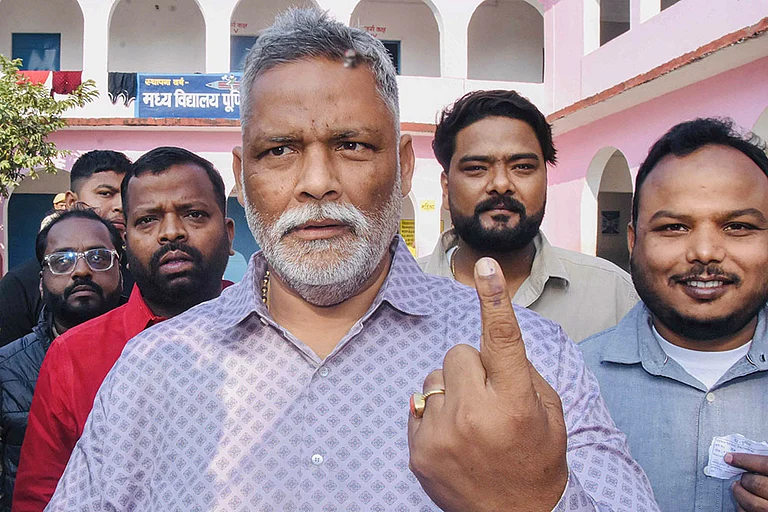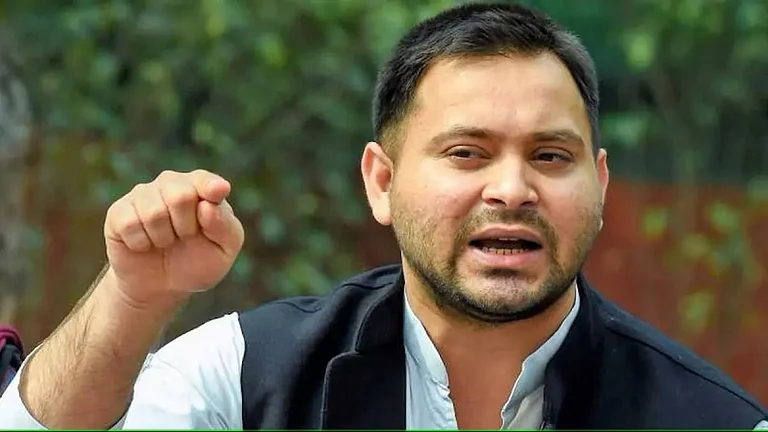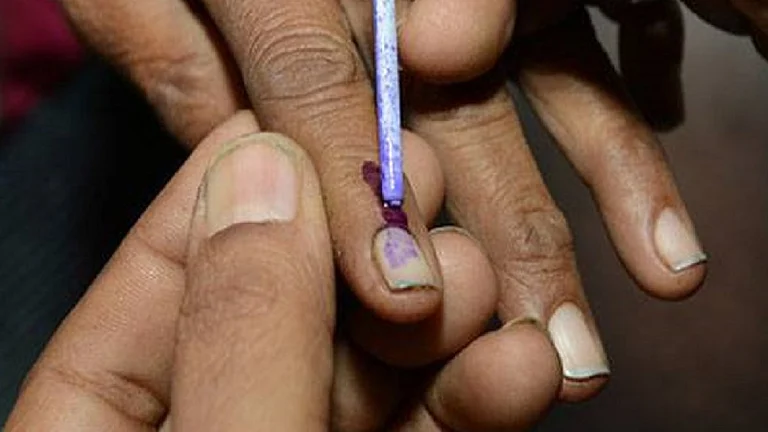
The Modi government transferred ₹7,500 crore to more than 75 lakh women in Bihar through a rural employment-linked support scheme, aiming to strengthen women’s economic independence and political agency.
Tejashwi Yadav and the RJD are targeting young women with promises of ₹1,000 monthly support, 10 lakh government jobs, and improved law and order, signalling a shift from welfare to economic opportunity.
The Election Commission’s recent Special Intensive Revision (SIR) of voter rolls allegedly removed 23 lakh women voters in Bihar, raising concerns about gendered disenfranchisement in key constituencies.
On a late afternoon in a Delhi hostel, 22-year-old Khushi Sharma from Gaya scrolls through Instagram reels about elections and the change in the status in women back home in Bihar. Her mother, sitting with family in Gaya, declares, “We’ll vote as a family, like always.” Khushi smiles: “I’ll vote for what I believe in.”
Her words capture a generational shift underway in Bihar. The rise of the ‘daughter voter’. The young, educated, and connected women of Bihar are beginning to assert their political choices in a state long defined by patriarchal traditions, caste loyalties, and the ‘jungle raj’ legacy.
While the political catchphrase ‘jungle raj’ once described Bihar’s lawlessness, for young women, the insecurity it symbolised hasn’t entirely disappeared. Is safety, or the lack of it, still central to how women approach elections today?
Senior journalist and political commentator Neerja Chowdhury says the current CM Nitish Kumar created much of his political legacy around women. From free bicycles and school uniforms to prohibition and self-help groups, it all worked to benefit women. “Older women still remember the law-and-order situation during the jungle raj era. But younger women, who never really witnessed that phase, may be voting on different priorities like better opportunities, even caste factors or simply a change.”
Chowdhury says even RJD leader and INDIA bloc Chief Minister candidate Tejashwi Yadav is now trying to reach this generation with a new vocabulary of aspiration, promising income support and employment instead of welfare. Meanwhile, the Modi government too transferred ₹7,500 crore to more than 75 lakh women in Bihar through a rural employment-linked support scheme, which analysts believe was designed to strengthen women's support.
Voices from Home to Classroom
The change is not only visible in public spaces. As it’s happening inside homes, too. “It was once the norm that the father, as head of the family, decided who we voted for. Mothers simply followed, as there was nothing to discuss,” says Aprajita Shruti, researcher at the A.N. Sinha Institute of Social Studies, Patna.
“Thankfully, those times are long gone. We are informed, opinionated, and exposed. We can articulate our demands. The idea that I will discuss my vote with my father or mother doesn’t even occur to me. What I might consider while voting is completely different from what my parents would believe.” Her words reflect a generational confidence growing among young women studying in Patna, Delhi and other cities.
Beyond the Old Jungle Raj
According to political analyst Manisha Priyam, today’s young women are not just beneficiaries of state welfare but aspirational citizens trying to move beyond fear. “The young women of Bihar are full of dreams. They want to have new-age careers and take on the world. They definitely don’t want to remain confined to their homes or follow the traditional path that their mothers took. For this, they are demanding safety so that they can attend their colleges and complete their education. They want measures like women-friendly police stations where they feel heard. Safety remains a core issue,” she says. For Bihar’s daughters, the rhetoric of ‘jungle raj’ today is less about the 1990s and more about the daily struggle for safety, mobility and dignity, she adds.
According to the Congress, the Election Commission’s recent Special Intensive Revision (SIR) of voter rolls has allegedly led to the removal of around 23 lakh women voters in Bihar. The party claims that these deletions occurred in constituencies that witnessed close contests in 2020, raising concerns of gendered disenfranchisement. The EC maintains that the revision was part of a routine update to ensure accuracy.
Bicycles to Banking
Schemes such as the Mukhyamantri Balika Cycle Yojana gave girls mobility and confidence to continue schooling. Financial inclusion followed. The share of women with bank accounts rose from 26 per cent in 2015–16 to 76 per cent by 2019–20, signalling greater control over money, and over votes. “Nitish Kumar chose to work for women for the past 20 years, and women won’t forget that, especially the older lot,” says Chowdhury. “It is possible that the younger ones would vote on aspiration, some even on caste, because this lot hasn’t witnessed the real lawlessness, kidnappings, the sense of fear that once gripped Bihar,” she adds.
The liquor ban of 2016, while controversial, remains popular among many women who experienced fewer alcohol-related abuses at home. Meanwhile, 50 per cent reservation in panchayats brought thousands of women into grassroots governance, shifting the image of the woman voter from silent to central.
Psephologists and founder of VoteVibe Amitabh Tiwari adds, “Voting is an emotional decision. With the passage of time, people have reached different stages of life, and so have their needs. With these schemes, an ecosystem was created for all, particularly women, to thrive and be capable of making such decisions. With the cycle distribution, more women were able to go to school and get an education. With reservations in panchayats and jobs, more bank accounts were opened by women. This gave them more confidence. Interestingly, with the ban on liquor, their situation at home improved as there was a marked decline in domestic violence cases.”
The New Politics of Promise
Now, younger leaders like Tejashwi Yadav are attempting to reach the same constituency with a different vocabulary, one that mixes economic assurance with aspiration. His party, the Rashtriya Janata Dal (RJD), has promised ₹1,000 a month for women, 10 lakh government jobs, and an emphasis on better law and order. “Tejashwi is trying to connect with the same women who benefited from Nitish’s policies, but he’s speaking a different language, one of opportunity and income, and he might be able to impress some of the younger voters,” says Chowdhury.
The Mahagathbandhan, of which RJD is a part, has made women’s employment and economic participation a core election message this time. For many young voters, particularly those in smaller towns or first-generation college students, these promises of financial support and jobs resonate deeply. “Nitish built his politics around mobility and safety as symbols of empowerment. Tejashwi’s narrative leans on dignity through income and independence,” she adds.
Freedom, One Negotiation at a Time
Many young women balance ambition with family expectations and caste loyalties. “The woman voter isn’t a monolith,” says Priyam. “She’s aspirational yet anxious. She doesn’t want aarkshan (reservation). She wants suraksha (security). She dreams of jobs and dignity, but still navigates a system that doesn’t fully see her.”
Priyam believes improved law and order, stronger local institutions, and better education access are crucial. “When women feel safe to step out, go to college or work, and know there’s a police station that will hear them, their political agency naturally grows,” she says.
Shruti agrees: “Bihar’s young women are no longer just beneficiaries of welfare. They’re shaping conversations around safety, education and rights. They vote not just for parties, but for possibility.”
From the Family Vote to the Female Voice
In the 2020 Assembly elections, women’s voter turnout in Bihar was 59.7 per cent, higher than men’s 54.7 per cent. Yet only 26 women MLAs were elected to the 243-member assembly, just over 10 per cent. The 2020 Assembly elections showed that women voters in Bihar exceeded men since 59.7 per cent of women voted, compared to 54.7 per cent of men. The election resulted in 26 women winning the assembly seats out of 243, which made up less than 10 per cent of the total representation. The gap between women as voters and women as representatives remains wide.
As Khushi prepares to cast her first vote on November 11, she reflects on both progress and the road ahead. “I want to choose my own future,” she says.
Thus, Bihar’s daughters are out to negotiate their freedom... Step by step, pedal by pedal, ballot by ballot.





























